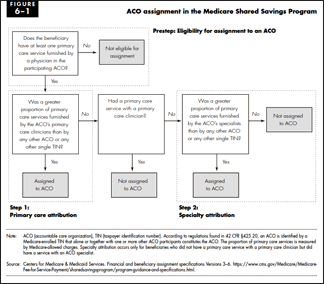Beneficiary Attribution
Background
Attribution or “assignment” is a key program methodology used to identify the beneficiaries associated with an ACO and defines the population for which the ACO is held accountable. Beneficiary assignment lists are used for program operations such as developing quarterly program reports, determining the ACO’s financial and quality performance, and determining whether an ACO is eligible to share in savings or losses. Generally speaking, assignment is determined based on the use of primary care services. CMS provides Basic and Enhanced Track ACOs the choice between prospective assignment or preliminary prospective assignment with retrospective reconciliation for agreement periods beginning July 1, 2019, and thereafter. The change was included in the final Pathways to Success rule and supported by NAACOS. The ACO REACH Model uses prospective assignment.
Overview
Click the image to the right to view in a larger format
- CMS resource: MSSP Shared Savings and Losses and Assignment Methodology
- CMS regulations governing MSSP assignment
- CMS factsheets for beneficiaries on how to choose a primary clinician on MyMedicare.gov, available in English and Spanish
- CMMI sample Next Generation ACO participation agreement with description of beneficiary alignment process.
News and Advocacy
- NAACOS supports bill that revises MSSP assignment to enhance the role of NPPs
- NAACOS resource: The Impact of Retrospective Versus Prospective Attribution on Your ACO
- NAACOS Report: Evaluation of Potential ACO Performance Bias from Retrospective and Prospective Assignment
- NAACOS in-depth analysis of the final Pathways to Success rule
- Frequently Asked Questions on the final Pathways to Success Rule
- NAACOS statement on the final Pathways to Success rule
- NAACOS Essentials on MSSP Voluntary Alignment
- NAACOS Summary of the Final 2018 Medicare Physician Fee Schedule Rule
- NAACOS submits comments to CMS on the proposed 2018 Medicare Physician Fee Schedule which includes proposals affecting MSSP assignment

